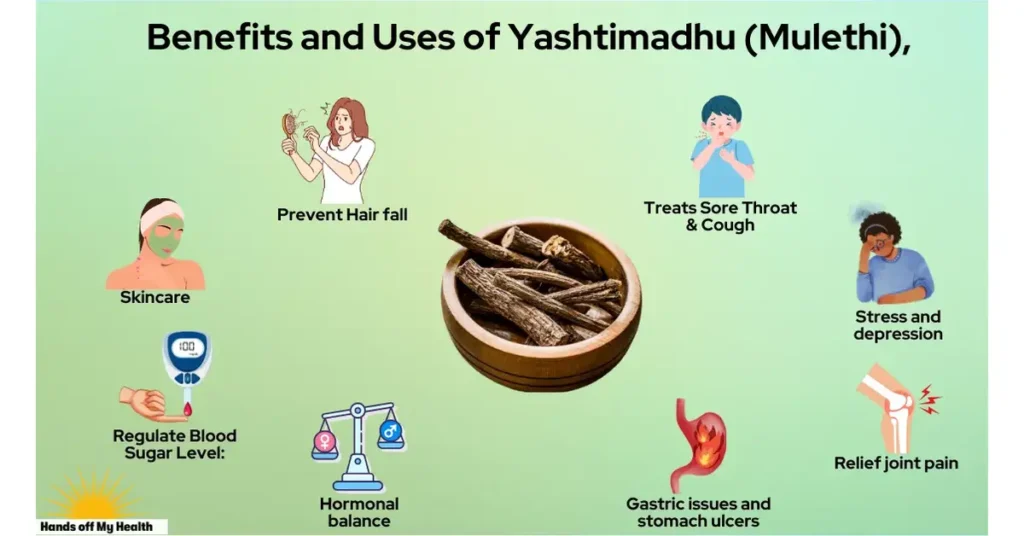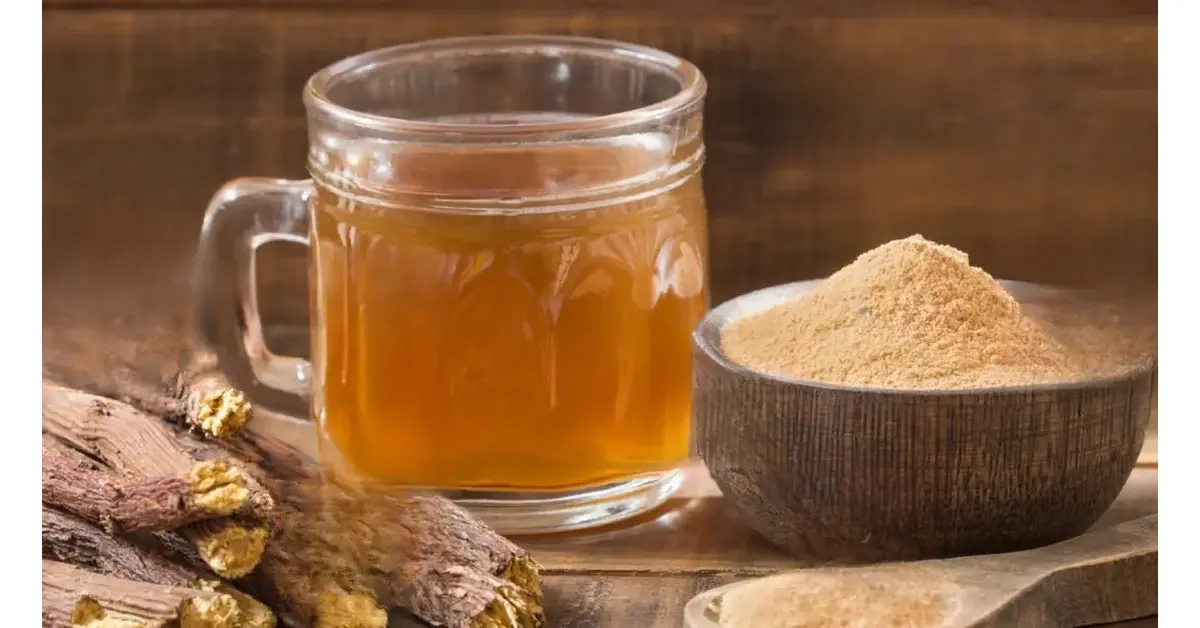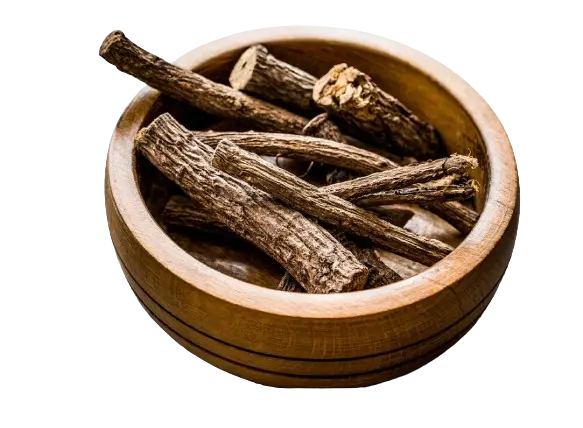Yashtimadhu or Mulethi is botanically known as Glycyrrhiza Glabra. The roots of the Mulethi tree are recognized for their various medical properties. In Yastimadhu “ Yasti ”means stem, and “Madhu” means Sweet. Therefore, Yashtimadhu also refers to the sweet stem.
It is cooling in nature and offers numerous health benefits such as Sore Throat and Cough. It promotes better digestion, relieves joint pain, boosts immunity and skin health, promotes hair growth, Manages High Cholesterol, and is also used for mouth ulcers and Diabetes.
Yashtimadhu or Mulethi can be taken and used in various forms, such as powder, tea, extract, and Mulethi water.
Habitat of Yastimadhu (Mulethi)
Mulethi grows in dry, hot, and sunny climates with low annual rainfall. Adequate soil moisture is required for its optimal growth in the North-West region of India.
Chemical composition of Yashtimadhu (Mulethi)
- Glycyrrhizin: Glycyrrhizin compound present in Yashtimadhu (Mulethi) is responsible for its sweet taste. It is 30 to 50 times sweeter than sugar and leaves a lingering sweetness in the mouth.
- Aglycone glycyrrhetinic acid: On hydrolysis, Glycyrrhizin converts into aglycone glycyrrhetinic acid and loses its sweetness.
- Chalcone Glycoside Isoliquiritin: This compound is responsible for the Yellow color of Yastimadhu (Mulethi).

Yashtimadhu uses and benefits
1. Skincare
Melanin Regulation:
- Melanin is a pigment responsible for the color of our skin, eyes, and hair, and excessive production of melanin causes Dark spots and pigmentation.
- An uneven melanin distribution is due to sun exposure, hormonal changes, and aging. Mulethi (Yashtimadhu) helps in the regulation of melanin production and makes skin brighter.
- Yastimadhu contains Glabridin, which is effective for skin health. Applying a Yastimadhu-based pack on the skin blocks UV radiation from the sun.
2. Prevent Hair fall and premature graying of hairs
- Balance vata and pitta doshas: An imbalance in vata and pitta doshas can cause hair fall, and premature graying of hair, and yastimadhu helps in balancing doshas.
- Anti-Inflammatiory property: Inflammation can cause hair fall and Mulethi acts as an Anti-Inflammatiory agent that helps in preventing premature greying of hair.
- Blood circulation: Mulethi powder helps improve blood circulation in the scalp and helps in nourishing hair by providing essential nutrients.
3. Treats Sore Throat & Cough
- Expectorant Properties: Mulethi possesses Expectorant Properties that help in thinning mucus in the airways and help in relieving throat irritation, and cough.
- It helps the process of coughing up thick yellow phlegm that accumulates in the lungs.
- Emollient and demulcent properties: Due to its emollient (soothing) and demulcent properties, it helps relieve scratchy throat, throat irritation, and hoarseness of voice. It provides comfort and relief by lubricating the respiratory tract.
4. Controls Cholesterol Level
- Mulethi helps control bad Cholesterol (LDL) levels in the blood and enhance good cholesterol (HDL) levels, promoting a healthier lipid profile.
- Mulethi contains anti-oxidants that help to prevent oxidative stress and oxidative stress is linked to Cholesterol.
- Mulethi helps in improving digestion and better digestion maintains healthy Cholesterol levels and helps in absorbing essential nutrients.
5. Hormonal balance
- Phytoestrogenic Properties: Yashtimadhu contains phytoestrogens (“Phyto” means plants, and “estrogen” refers to a female hormone that regulates various functions in both men and women ) bio-active substances that help in maintaining hormonal balance. Therefore, it helps relieve Menstrual cramps, sweating during menstruation, Insomnia, mood swings, and more.
6. Gastric issues and stomach ulcers
- Anti-inflammatory: It helps reduce inflammation in the stomach lining and prevents certain gastric problems such as Nausea, Abdominal bloating, Abdominal pain, Vomiting, Indigestion, Burning sensation in the stomach, Hiccups, Loss of appetite, Black and tarry stools.
- Analgesic: It acts as a natural pain killer, providing relief from discomfort associated with stomach conditions.
- Antiulcerative: It prevents the formulation of ulcers in the stomach. The glycyrrhizic acid in Yashtimadhu is known to stop the growth of Helicobacter pylori, a bacteria that causes ulcer disease and gastritis.
7. Regulate Blood Sugar Level
- Yashtimadhu (Mulethi) contains the potent phytoestrogen compound called Glycyrrhizin. This compound gives a sweet taste to the roots and indirectly helps in regulating blood sugar levels.
- Glycyrrhizin helps in maintaining stable blood glucose levels by activating insulin production from β-pancreatic cells.
8. Stress and depression
- Adaptogenic properties: Yastimadhu contains adaptogenic properties
- Which helps in regulating stress hormones and assists in anxiety management. It Contributes to the state of calmness and emotional balance.
- Gut-Brain Connection:
- The gut and brain are closely connected. Yastimadhu maintains a healthy digestion and healthy gut influence on mood and stress levels.
9. Relief joint pain
- Anti-Inflammatory Properties: Yastimadhu possesses anti-inflammatory properties, which can help reduce inflammation in the joints. It provides relief from conditions such as rheumatoid arthritis (painful joints, swelling, and stiffness in the joints).
- Balancing doshas: According to Ayurveda, Yastimadhu balances vata and pitta doshas. Its sweet taste and cold potency help control unbalanced Vata, which is linked to joint pain.
Dosage and uses of various forms of Yashtimadhu (Licorice)
- Yastimadhu Root Powder/churna: Recommended dosage is 2-5 grams per day divided into 2 to 3 times a day. It can be combined with warm water or honey and can also be consumed with milk.
- Yastimadhu Capsules: The dosage should follow the instructions on the product packaging or as recommended by your healthcare provider. The capsules are usually consumed with water, preferably after meals.
- Yastimadhu Extracts: The dosage can vary based on the concentration of the extract. It’s best to follow the instructions on the product label or consult with a healthcare professional. The extract is typically mixed with water or juice for consumption.
- Yastimadhu Tea: If you are using Yastimadhu as part of an herbal tea, typically, 1-2 cups per day is a standard recommendation. You can buy pre-made Yastimadhu tea bags or use Yastimadhu root powder to make your tea.
- Chewing Yastimadhu Sticks: Chewing on a Yastimadhu stick is a traditional method. You can chew on a small piece (about 1 inch) multiple times a day. The juice released can be consumed slowly.
- Yashtimadhu Taila: It is used in nasal therapy in Ayurveda, which involves the nasal instillation of drops of Yastimadhu oil. You can apply a few drops of oil into each nostril, inhale gently, and massage the area of your nose with your fingertips to spread and absorb into nasal passages.
Potential Side Effects of Yashtimadhu (Mulethi)
- Hypertension (High blood pressure): The compound glycyrrhizin present in Yastimadhu causes sodium and water retention in the body. Too much water and sodium in the bloodstream makes the heart work harder to maintain blood flow, so it is recommended for people suffering from Hypertension to consult with a healthcare provider or a professional Ayurvedic practitioner.
- Hyperkalemia (High potassium level): When Yastimadhu is consumed in excessive amounts, it can increase the potassium level in the body. This condition is called Hyperkalemia. High potassium levels in the body can cause the following symptoms: Tiredness or weakness, A feeling of numbness or tingling, Nausea or vomiting, Trouble breathing, Chest pain, Palpitations, or irregular heartbeats. Those who take medication that affects potassium levels should avoid or consult a healthcare provider or a professional Ayurvedic practitioner.
- Hormonal Imbalance: Yashtimadhu contains phytoestrogens, which are Plant based compounds that have similar effects as estrogen in the body. It is beneficial for managing menopause (A natural process of aging in which ovaries stop producing reproductive hormones) symptoms in women. Excessive consumption of Yastimadhu can cause hormonal imbalance in both men and women. Individuals should avoid Yastimadhu if they have a history of hormonal-related disorders.
- Allergic reaction: Allergic reactions to Yastimadhu can occur in some individuals. Symptoms of an allergic reaction may include skin rashes, itching, swelling, or difficulty breathing. Individuals experiencing this Allergic reaction should avoid or consult a healthcare provider or a professional Ayurvedic practitioner.
- Interaction with certain medications: Individuals should consult with a health care provider before taking Yastimadhu if the individual taking medications that can react with Yastimadhu.
Conclusion
Yastimadhu is known for its medical properties in Ayurveda. The glycyrrhizin compound inYastimadhu makes it sweet, which is 30 to 40 times much sweeter than sugar. That is why it is also called “licorice.” It offers numerous health benefits such as skin care, Prevent Hair fall and premature graying of hair, Treats Sore Throat & Cough, controlling Cholesterol, gastric issues, and stomach ulcers, regulating blood sugar levels, and many more. It can be taken in various forms, such as powder, tea, extract, chewing Yastimadhu sticks, etc.
It should be advised to take its different forms in a recommended dosage or consult with a health care provider because it also has several side effects such as Hypertension, Hyperkalemia, hormonal imbalance, allergic reaction, and interaction with certain medications.
Disclaimer: The information provided on this site is intended solely for educational and informational purposes. It is not meant to diagnose, treat, cure, or prevent any disease or condition. Always first consult with your doctor or another qualified healthcare provider before using any Ayurvedic products or following advice from this site.


